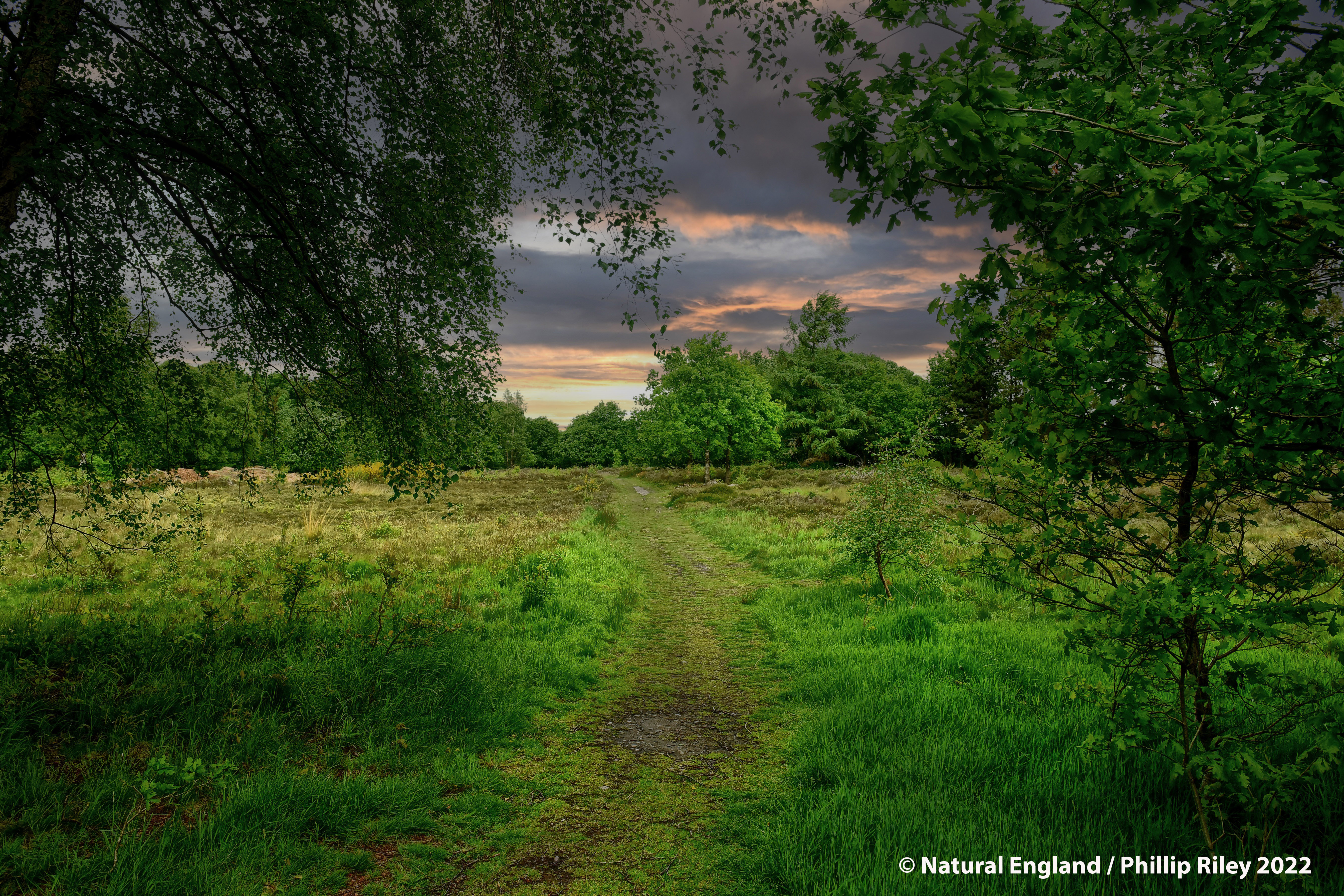Walsall and Lichfield Councils case study explores their experiences of collaborating with Natural England on a largescale landscape project.
Introduction
Purple Horizons is a Nature Recovery Project funded by Natural England which aims to reconnect residents with nature and enhance local biodiversity. PAS spoke to Walsall and Lichfield Councils to find out what it’s like to be involved on the multi-partnership project.
Credit: Natural England/Phillip Riley.
Background
Walsall Council announced a climate emergency in September 2019. A steering group was subsequently formed to create a climate action plan and a climate change champion. The Action Plan was approved by Cabinet in October 2020. Walsall Council is also member of the West Midlands Combined Authority which published its 2021-2026 Environment Plan in September 2021, a document that identifies existing nature recovery projects in Walsall.
In 2016 Lichfield District Council became one of the first local authorities in the country to require that all development must incorporate Biodiversity Net Gain (BNG) as part of seeking planning permission. This was achieved through policy in their adopted Local Plan and a Supplementary Planning Document (2016) requiring a minimum 20% Biodiversity Net Gain from major developments and any scheme required to submit a biodiversity metric calculation.
Since then, they have declared a climate and biodiversity emergency, and have worked with the Staffordshire Wildlife Trust to develop a Nature Recovery Declaration. The Nature Recovery Declaration received unanimous backing at Cabinet and included the following actions:
- The implementation of the new Local Nature Recovery Strategy
- Achievement of Biodiversity Net Gain across all development
- Nature recovery to be embedded into all strategic plans
- A Cabinet member to lead on tackling nature recovery
The two councils are working together with the aim of restoring and enhancing the nature network across the two district boundaries. Land within Lichfield District is predominately agricultural and used for farming, whereas Walsall has greater opportunities for nature recovery projects through council-owned land and nature reserves.
The project
Natural England contacted Lichfield and Walsall Councils in June 2021 and asked to submit proposals for a large-scale nature recovery project covering both authorities. The two councils’ ecology teams collaborated and submitted a proposal to Natural England detailing a project covering 10,000 hectares. They subsequently found out they were successful in July 2021.
The Purple Horizons project began in August 2021 and is expected to run for three years with £200,000 of funding allocated for habitat management works, interpretation and equipment, consultants and partners.
The partnership project aims to restore and connect fragmented habitats including heathland, wetland, grassland and woodland, which will help wildlife populations to move and thrive between Cannock Chase, a Special Area of Conservation, and Sutton Park, a National Nature Reserve. A key focus of the project is to both increase the supply and quality of nature-rich spaces and also public enjoyment of these areas.
To begin the project, consultants 3Keel were commissioned by Natural England to develop a Green Finance analysis of the area. This included engagement with both local businesses and landowners and identified natural capital opportunities for the area.
A steering group was also created which meets monthly to manage the project and decide how funding will be spent and comprises a range of partners including the two councils, local wildlife trusts, Natural England, Environment Agency, RSPB, 3Keel consultants, University of Birmingham, Canal and River Trust and Dudley Council/Black Country UNESCO Global Geopark.
The steering group has informed the creation and funding of various schemes under the broader Purple Horizons project. For example, volunteers have been working alongside the council on Shire Oak Park to restore natural heathlands on the former quarry.
Lichfield District Council is also using developer contributions from Biodiversity Offsetting to restore heathland sites within the District and the Purple Horizons project area, to secure their future as a link in the heathland network across the Midlands.
Challenges and solutions
Community engagement
A challenge with the project has been engaging with local communities and highlighting the benefits of the project to them. To do this, Walsall Council used a portion of the initial £200,000 funding to work with local communities. This was carried out by the Birmingham and the Black Country Wildlife Trust at Tuners Wood through their community / education outreach programmes to educate and encourage young people to get involved with the nature recovery project. For example, tree and hedge planting has been underway at Turner’s Wood involving local schoolchildren.
Stakeholder engagement
A second challenge to the project is recognising how important private landowners are to the nature restoration and the linking of the two nature reserves. This is because a significant amount of land in Lichfield under the Purple Horizons project is owned by farmers and used for agriculture.
As part of the Green Finance analysis work landowners were interviewed to understand their experience of delivering environmental outcomes, their willingness to provide nature-based solutions, and identify opportunities and blockers to delivery. Further stakeholder engagement is currently underway with an additional £40,000 of project funding ringfenced to engage with local communities and landowners.
Impact
Purple Horizons recently received recognition for its nature recovery work, winning the Public Sector award at the West Midlands Combined Authority Natural Environment Awards. Julie Button, Natural England’s Project Manager for the Purple Horizons Nature Recovery Project, said:
"We are very proud the Purple Horizons Nature Recovery Project work has been recognised with this important award. We are working with a range of partners, landowners and communities to deliver resilience for nature and an environment where people’s health and wellbeing can thrive on the edge of the West Midlands urban fringe.”
“The Purple Horizons Nature Recovery Project is about delivering a great place for nature and people to thrive while tackling the adaptations and mitigation needed for climate change.”

